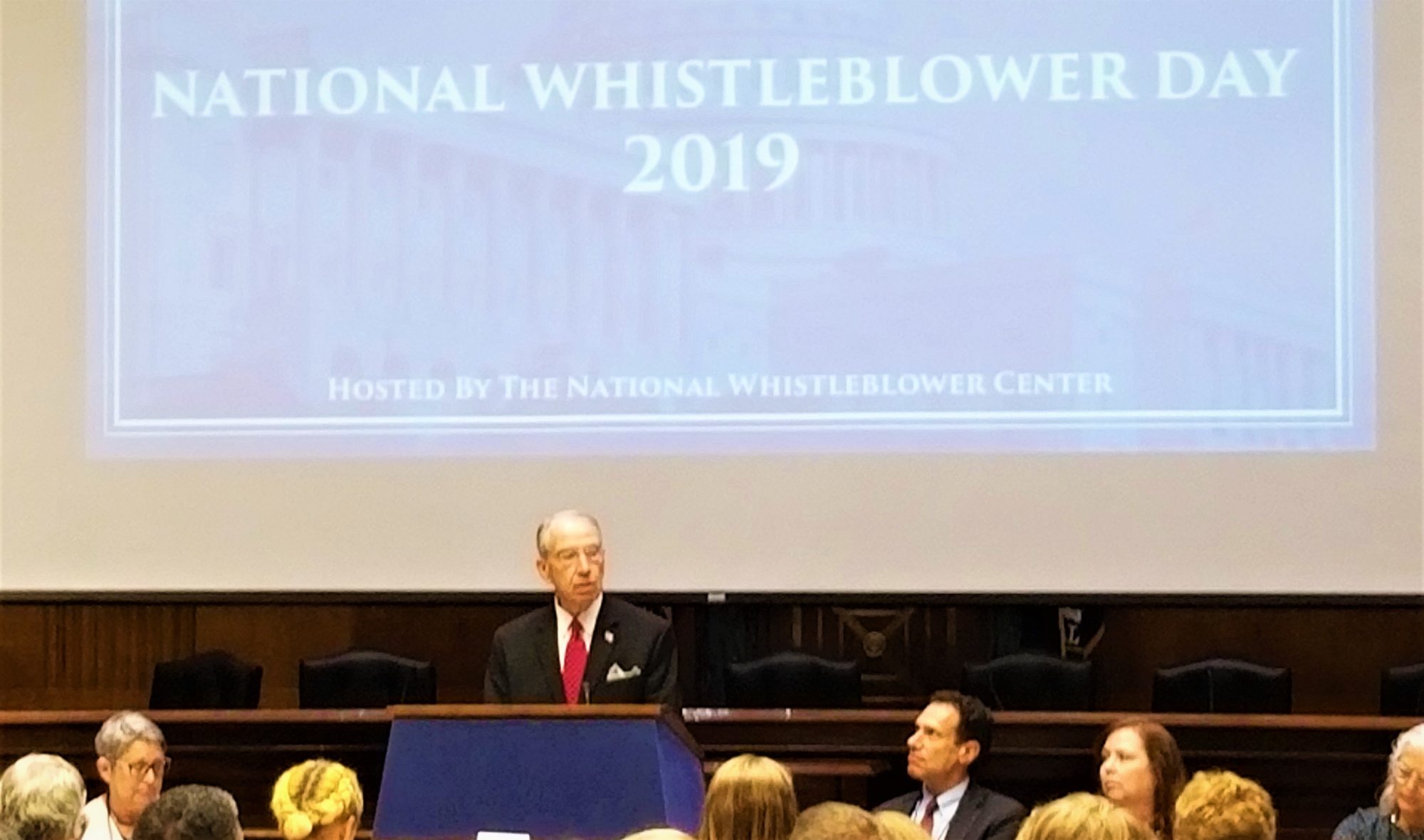2019 Whistleblower Summit: Commemorating Truth-Tellers
By Shanna Devine

This is the second in a three-part series.
The Eight Annual Whistleblower Summit & Film Festival coincided with National Whistleblower Appreciation Day on July 30, the day when advocates and lawmakers mark the importance of blowing the whistle on wrongdoing. Senate Resolution 194 and House Resolution 240 encourage the federal government to officially and permanently recognize the day and observe it by “informing employees, contractors working on behalf of United States taxpayers, and members of the public about the legal right” to blow the whistle, and “acknowledging the contributions of whistleblowers to combating waste, fraud, abuse, and violations of laws and regulations of the United States.”
Members of the bipartisan Congressional Whistleblower Protection Caucuses cosponsored the House and Senate resolutions and commemorated these modern-day heroes at a luncheon commemorating whistleblowers. The event, hosted by the National Whistleblower Center, honored the dozens of truth-tellers in the room spanning government and the private sector who have taken grave risks to disclose wrongdoing in order to protect the public interest.
Senator Wyden (D-Ore.), Co-Chair of the Senate Whistleblower Protection Caucus, received vigorous applause as he declared, “If I had my way, every single day in America ought to be Whistleblower Appreciation Day!” Paying tribute to his Co-Chair of the Caucus, Wyden captured how whistleblowing and its supporters transcend party-lines: “The gold standard, when it comes to legislative championing of whistleblower rights, is Chairman Chuck Grassley.” Four decades ago Senator Grassley (R-Iowa) led enactment of the Whistleblower Protection Act – the primary whistleblower law for federal employees outside of the intelligence community. He has continued to be a staunch advocate for whistleblowers across administrations, earning his title as the “Godfather” of whistleblower protections.
Grassley used the occasion to announce three new members to the Caucus – Senators Marsha Blackburn (R-Tenn.), Tammy Duckworth (D-Ill.) and Krysten Sinema (D-Ariz.), bringing total membership to 14. Recognizing the whistleblowers in the crowd, he remarked, “You are the patriots … Thank you for stepping forward and for doing the right thing.” Grassley dedicated this year’s Whistleblower Appreciation Day “to the person I call the grandfather of all whistleblowers”, the late Ernie Fitzgerald.
Fitzgerald, a pioneer Pentagon whistleblower from the 1960’s who coined the term “committing the truth” – because he and other truth-tellers were treated like they had committed a crime – called the public’s attention to billions of dollars of taxpayer waste and fraud on military weapons, planes and spare parts. The Senator asserted, “The only crime that whistleblowers do is truth … and I’m grateful that there are whistleblowers out there even now who have picked up his sword and are marching forward.” Equating it to déjà vu, he explained how whistleblowers continue to expose price gouging in some of our largest defense contracts.
Grassley and the Caucus are doing their part to protect whistleblowers so they can protect taxpayers. He highlighted recent bipartisan legislative initiatives, including the Criminal Antitrust Anti-Retaliation Act, which would extend protections to whistleblowers who disclose criminal antitrust violations to the Justice Department. And Grassley and Senator Tammy Baldwin (D-Wis.) are preparing a companion bill to H.R. 2515, legislation to ensure that internal whistleblower disclosures pertaining to federal securities violations are covered under the Dodd-Frank Act.
In addition to Congress, whistleblowers are Inspectors Generals’ eyes and ears to government waste, fraud and abuse. In an effort to encourage more potential whistleblowers to come forward and to make more informed disclosures, Justice Department Inspector General (IG) Michael Horowitz announced the launch of oversight.gov/whistleblowers – a joint initiative between the Council of the Inspectors General on Integrity and Efficiency (which Horowitz chairs) and the whistleblower agency Office of Special Counsel. The webpage is a resource for whistleblowers on the available avenues to report wrongdoing, and the appropriate venue to file a whistleblower retaliation complaint. Underpinning a primary goal of the new resource, Horowitz affirmed, “We don’t want to be in a situation where we have to address retaliation, we want to prevent retaliation.”
His words resonated with former Enron Vice President Sherron Watkins, one of three female whistleblowers who made Time Magazine’s 2002 Persons of the Year. She closed out the event by recounting her experience nearly two decades ago. After she warned Enron chairman Kenneth Lay that the company “might implode in a wave of accounting scandals,” she described the psychological torment of coming forward: “it starts to feel scary, and the ground beneath your feet is so uncertain.” In Watkins’ parting words of wisdom, she cautioned, “If you don’t show up with a lawyer by your side, they are going to eat you up,” and try to bury the truth. A new whistleblower survival guide also implores potential whistleblowers to consult an attorney early in the process.
That evening the Summit awarded Public Citizen’s founder Ralph Nader with a Lifetime Achievement Award. We have Nader to thank for the term “whistle blowing,” which he coined in 1971 at the Conference on Professional Responsibility in Washington, D.C., and defined it as “the act of a man or woman who, believing that the public interest overrides the interest of the organization he serves, publicly ‘blows the whistle’ if the organization is involved in corrupt, illegal, fraudulent or harmful activity.” That term helped to portray these committed employees in a more positive light and paved the way for professional advocacy on behalf of whistleblowers. Nearly half a century later, Nader’s definition has withstood the test of time.
We also believe that every day should be Whistleblower Appreciation Day, so we send our heartfelt thanks to the courageous whistleblowers who hold our government and corporations accountable, too often at great personal cost; to the Members of Congress, IGs and other public servants who are working to protect our truth-tellers in the process; and to the pioneers of the movement to speak truth to power.